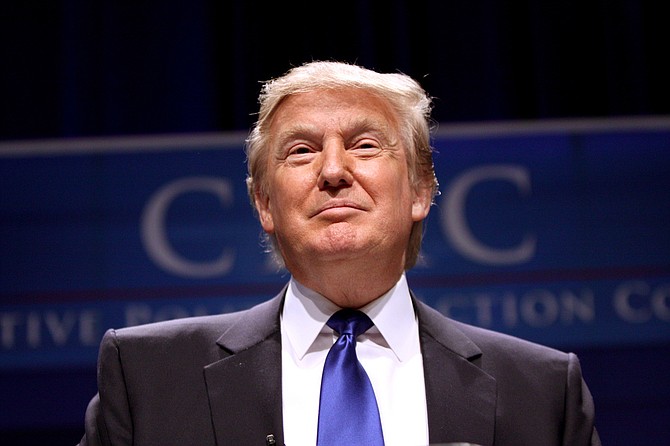President Donald Trump is spreading a false claim from supporters that people who are in the United States illegally receive more in federal assistance than the average American gets in Social Security benefits. Photo courtesy Flickr/Gage Skidmore Photo by Flickr/Gage Skidmore
WASHINGTON (AP) — President Donald Trump is spreading a false claim from supporters that people who are in the United States illegally receive more in federal assistance than the average American gets in Social Security benefits.
Everything about the tweet he passed on to his 56 million listed Twitter followers Tuesday is wrong.
In a tweet of his own, Trump sketched an overly simplistic portrait of the auto industry in suggesting that General Motors plants slated for closure would be chugging along if foreign cars were heavily taxed in the U.S. market.
IMMIGRATION
TRUMP's retweet: "Illegals can get up to $3,874 a month under Federal Assistance program. Our social security checks are on average $1200 a month. RT (retweet) if you agree: If you weren't born in the United States, you should receive $0 assistance."
THE FACTS: Wrong country, wrong numbers, wrong description of legal status of the recipients. Besides that, immigrants who are in the U.S. illegally do not qualify for most federal benefits, even when they're paying taxes, and those with legal status make up a small portion of those who use public benefits.
The $3,874 refers to a payment made in Canada, not the U.S., to a legally admitted family of refugees. It was largely a one-time resettlement payment under Canada's refugee program, not monthly assistance in perpetuity, the fact-checking site Snopes found a year ago in debunking a Facebook post that misrepresented Canada's policy. A document cited in the Facebook post, showing aid for food, transportation and other basics needs, applied to a family of five.
Apart from confusing Canada with the United States, the tweet distributed by the president misstated how much Americans get from Social Security on average — $1,419 a month for retired workers, not $1,200.
Overall, low-income immigrants who are not yet U.S. citizens use Medicaid, food aid, cash assistance and Supplemental Security Income aid at a lower rate than comparable U.S.-born adults, according to an Associated Press analysis of census data. Noncitizen immigrants make up only 6.5 percent of all those participating in Medicaid, for example.
Despite that, the administration wants to redefine the rules for immigrants to further restrict who can receive benefits and for how long.
A retweet is not necessarily an endorsement of the opinion it contains, but Trump does not populate his Twitter feed with views that are contrary to his own.
GM
TRUMP: "The reason that the small truck business in the U.S. is such a go to favorite is that, for many years, Tariffs of 25% have been put on small trucks coming into our country. It is called the 'chicken tax.' If we did that with cars coming in, many more cars would be built here ... and G.M. would not be closing their plants in Ohio, Michigan & Maryland. Get smart Congress. Also, the countries that send us cars have taken advantage of the U.S. for decades. The President has great power on this issue - Because of the G.M. event, it is being studied now!"
THE FACTS: It's a stretch to conclude that the plants General Motors plans to close would be spared if foreign-made cars were subject to hefty duties. Tariffs could indeed be an incentive to build cars in the U.S., but the overarching problem for GM is that people aren't buying cars like they used to. More want SUVs or trucks now.
The 25 percent tariff on pickup trucks imported into the U.S. was put in place years ago to protect the Detroit Three's major profit centers from imported pickups. It does not apply to trucks imported from Canada or Mexico at present. So GM, for instance, builds pickups in Mexico and exports them to the U.S. without such a tariff. Fiat Chrysler also builds heavy-duty Ram pickups in Mexico, although it plans to move that production to the U.S. next year.
Japanese automakers, mainly Toyota and Nissan, use U.S. plants to build nearly all of the pickups that they sell in the country. Honda switched production from Canada to Alabama. Toyota does sell a small number of Mexican-built Tacoma pickups in the U.S., but most are built in Texas.
So there are grounds to believe car duties could make a difference, but it's not that straightforward.
Six years ago cars were 49 percent of new-vehicle sales in the U.S., while trucks and SUVs were 51 percent. Through October of this year, it's 68 percent trucks and 32 percent cars. All the factories GM wants to close make cars that aren't selling well. The Commerce Department has been studying whether it can use national security reasons to justify putting tariffs on imported cars but has yet to make a decision.
Most automakers, including those based in Detroit, import vehicles from abroad that would be affected by any tariffs. And U.S. car exports would probably be subject to new or higher tariffs overseas.
Copyright Associated Press. All rights reserved. This material may not be published, broadcast, rewritten, or redistributed.



Comments
Use the comment form below to begin a discussion about this content.